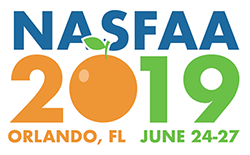Student Reflections About Financial Aid: Pre, During, and Post-College, 9:45 - 10:45 a.m.
By Allie Arcese, Director of Communications
By Allie Bidwell, NASFAA Senior Reporter
Applying for financial aid and navigating how to set up a budget to pay for college can be challenging for students, particularly those from low-income families or those who are the first in their families to go to college. In a Tuesday morning session, three current and former college students shared their own experiences with financial aid, and how aid offices can help better serve students.
The students—Mina Yakubu, Jacqueline Lin, and Anneleissa Coen—were all first-generation students, attending the University of North Carolina-Chapel Hill, Harvard College, and Middlebury College and Reed College, respectively. Yakubu and Lin shared that in addition to lacking the support some students have from parents when applying for aid, they also had to translate the questions and instructions into another language for their parents.
They all had different experiences with regard to expectations for attending college. Coen said that while there “wasn’t much of a college-going culture” where they grew up in Oregon, their parents encouraged them to attend college and find a way to pay for it. On the other hand, Lin, who grew up in Jersey City and attended a magnet high school, said there was a “huge” college-going culture.
“But what I found was that for many students, students like me, our parents didn’t attend college,” she said. “So, yes, while there was the desire to attend colleges, highly selective colleges, there wasn’t really a discussion surrounding financial aid. You had students applying, but not knowing how to finance their education.”
Before attending college, the speakers said, their knowledge about financial aid was limited. Yakubu, for example, said she had a “one-dimensional” view of aid, and that she thought financial aid was limited to loans. Coen, for example, said they were unaware that need-based aid existed, and that students only had access to merit-based aid.
As far as the application, the speakers mentioned a number of pain points that made the process difficult, aside from answering many questions. Coen said they had to navigate getting a noncustodial parent waiver. Lin mentioned that because her mother speaks English as a second language, she had to be able to understand complicated language herself and then translate it for her mother. Yakubu also said the language of applications were difficult, and that she had to translate the questions. “At the end of the day, I was the one arranging the paperwork that had to be submitted,” she said, recalling her confusion around tax information that was required.
Coen said that peer mentoring could help students better maneuver the process of applying for aid, both as incoming students and in the years during their programs. Being able to offer support not just when students first apply, but in an ongoing manner could be beneficial, they said.
All three speakers said they would support some standardization of the terminology used on financial aid award notifications, noting that when comparing their own offers across institutions, as well as helping siblings compare theirs, the notifications varied greatly.
Yakubu urged financial aid administrators to “prioritize creating a community of acceptance” within their offices.
“One of my first impressions was the smiles I saw on people’s faces,” she said of her first visit to the financial aid office. “If they didn’t know the answer to my question, they’d direct me to a person who knew. … These are things that can go without being said, but I see it every time. It allows for me and other students to walk in knowing we will walk out with answers—answers people have taken the time to walk us through.”
Publication Date: 6/25/2019












You must be logged in to comment on this page.